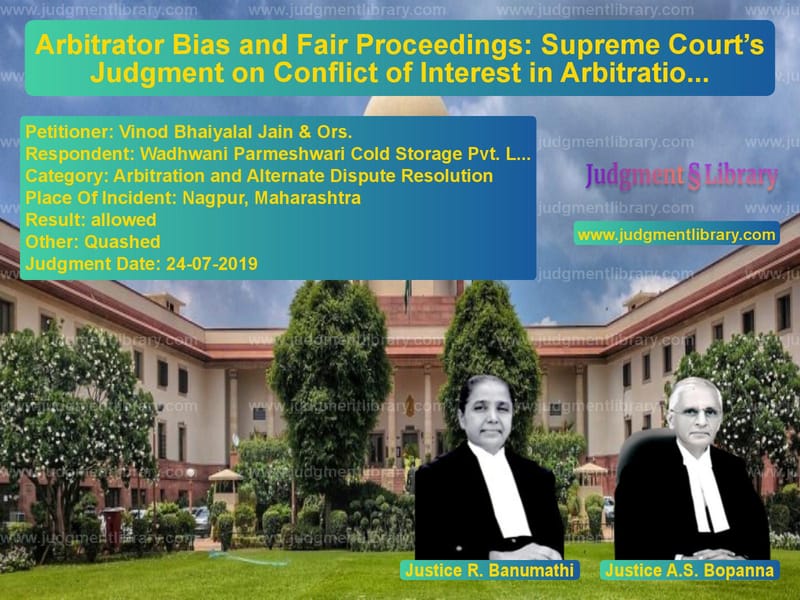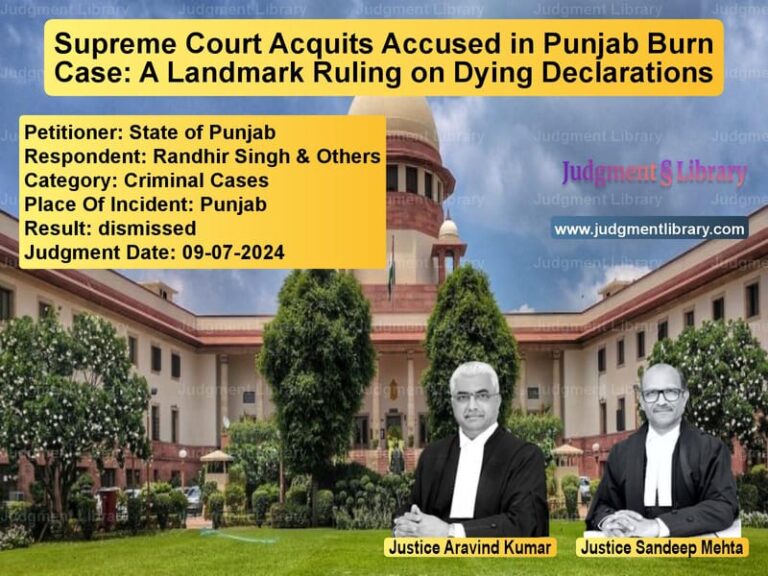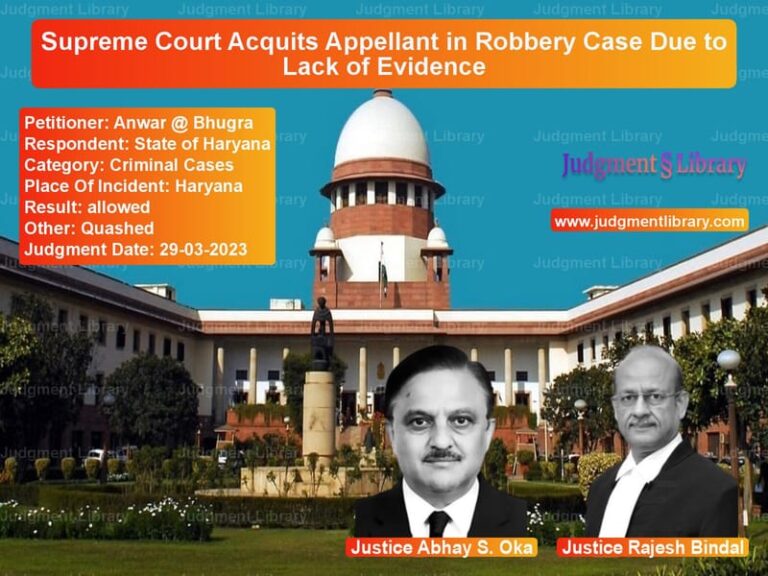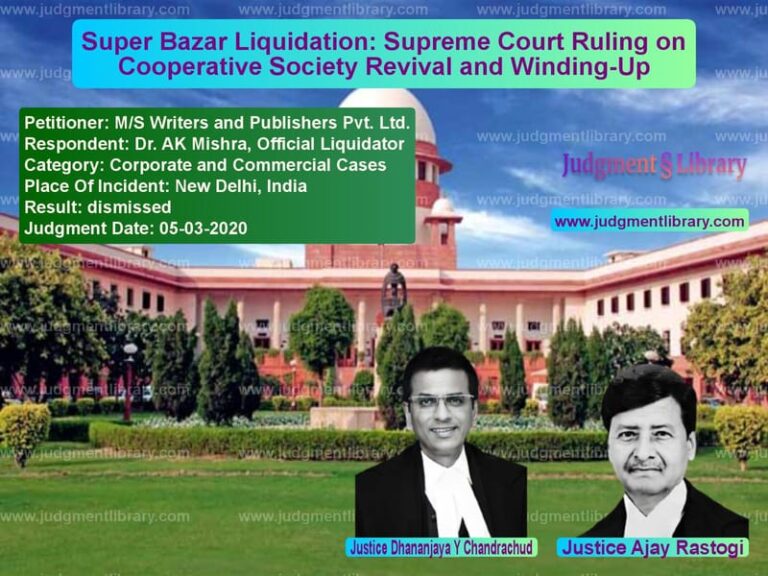Arbitrator Bias and Fair Proceedings: Supreme Court’s Judgment on Conflict of Interest in Arbitration
The case of Vinod Bhaiyalal Jain & Ors. v. Wadhwani Parmeshwari Cold Storage Pvt. Ltd. revolves around the issue of bias in arbitration proceedings and the requirement for an arbitrator to be impartial. The Supreme Court had to determine whether an arbitrator, who had previously acted as legal counsel for one of the parties, could fairly adjudicate the dispute.
Background of the Case
The appellants, Vinod Bhaiyalal Jain and others, were commission agents dealing in agricultural products. They used the services of Wadhwani Parmeshwari Cold Storage Pvt. Ltd. (respondent) to store their produce in 2004. However, due to alleged improper storage, the appellants claimed that their goods were damaged and sought compensation.
In response, the respondents denied liability and made a counterclaim. A dispute arose, and the respondents referred the matter to arbitration based on an arbitration clause contained in the storage receipt. The dispute was referred to Mr. S.T. Madnani, Advocate, as the arbitrator.
The appellants objected to this appointment, arguing that Mr. Madnani had previously represented the respondent in legal proceedings and thus had a clear conflict of interest. Despite these objections, Mr. Madnani proceeded with the arbitration and ultimately passed an award in favor of the respondents.
The appellants challenged this award under Section 34 of the Arbitration and Conciliation Act, 1996, before the Principal District Judge, Nagpur. The court ruled in favor of the appellants and set aside the arbitration award, citing bias and lack of impartiality on the part of the arbitrator.
The respondents appealed this decision before the Bombay High Court, which reversed the district court’s ruling and reinstated the arbitration award. Aggrieved by this decision, the appellants approached the Supreme Court.
Petitioner’s Arguments
The appellants contended that:
- The arbitrator had a clear conflict of interest as he had previously acted as legal counsel for the respondent.
- The arbitrator failed to disclose this conflict, violating Section 12 of the Arbitration and Conciliation Act, 1996, which mandates disclosure of any circumstance that may raise justifiable doubts about an arbitrator’s impartiality.
- They had formally objected to the appointment of the arbitrator before the proceedings began, yet their objections were ignored.
- The arbitrator’s conduct created an apprehension of bias, which undermined the fairness of the arbitration proceedings.
Respondent’s Arguments
The respondents countered that:
- The arbitration clause was valid and binding as per the storage receipt signed by the appellants.
- The appellants had not specifically objected to the arbitrator’s appointment under Section 13 of the Arbitration Act.
- The arbitrator’s prior legal representation of the respondent in another case did not automatically indicate bias.
- The High Court had correctly held that a reasonable person would not assume bias based on the arbitrator’s past legal association with the respondent.
Supreme Court’s Observations
The Supreme Court examined whether the High Court had erred in reinstating the arbitration award despite the arbitrator’s past legal involvement with the respondent. The key findings were:
- There was substantial evidence that Mr. Madnani had previously represented the respondent in a separate legal matter.
- The arbitrator failed to disclose this relationship, as required under Section 12 of the Arbitration and Conciliation Act.
- The appellants had raised timely objections regarding the arbitrator’s impartiality, which were ignored.
- In arbitration, justice must not only be done but must also “seem to be done.” Even a perception of bias is sufficient to render an arbitration award invalid.
Final Judgment
The Supreme Court set aside the High Court’s decision and reinstated the trial court’s ruling, concluding that:
- The arbitrator’s prior involvement as legal counsel for the respondent created a reasonable apprehension of bias.
- The arbitrator’s failure to disclose this conflict violated natural justice principles.
- Parties in arbitration must have confidence in the neutrality and fairness of the arbitrator.
- The arbitration award was therefore invalid and unenforceable.
- The parties were granted the liberty to initiate fresh arbitration proceedings with an independent arbitrator.
Impact of the Judgment
This ruling strengthens legal protections against arbitrator bias and reinforces the importance of disclosure requirements under arbitration law. The key takeaways from this judgment are:
- Arbitrators must disclose any prior professional relationships with parties to the dispute.
- Failure to disclose potential conflicts of interest can invalidate arbitration awards.
- Court intervention is justified where there is an apparent lack of impartiality in arbitration proceedings.
- Justice in arbitration must be seen to be fair, not just procedurally correct.
Conclusion
The Supreme Court’s ruling in this case sets a crucial precedent on the need for arbitrators to be free from even the appearance of bias. It reinforces that arbitration, as an alternative dispute resolution mechanism, must adhere to principles of fairness and transparency. By setting aside the arbitration award and directing fresh proceedings, the Court reaffirmed the right of parties to an impartial adjudication of disputes.
Petitioner Name: Vinod Bhaiyalal Jain & Ors..Respondent Name: Wadhwani Parmeshwari Cold Storage Pvt. Ltd..Judgment By: Justice R. Banumathi, Justice A.S. Bopanna.Place Of Incident: Nagpur, Maharashtra.Judgment Date: 24-07-2019.
Don’t miss out on the full details! Download the complete judgment in PDF format below and gain valuable insights instantly!
Download Judgment: Vinod Bhaiyalal Jain vs Wadhwani Parmeshwari Supreme Court of India Judgment Dated 24-07-2019.pdf
Direct Downlaod Judgment: Direct downlaod this Judgment
See all petitions in Arbitration Act
See all petitions in Institutional Arbitration
See all petitions in Dispute Resolution Mechanisms
See all petitions in Legal Malpractice
See all petitions in Judgment by R. Banumathi
See all petitions in Judgment by A. S. Bopanna
See all petitions in allowed
See all petitions in Quashed
See all petitions in supreme court of India judgments July 2019
See all petitions in 2019 judgments
See all posts in Arbitration and Alternate Dispute Resolution Category
See all allowed petitions in Arbitration and Alternate Dispute Resolution Category
See all Dismissed petitions in Arbitration and Alternate Dispute Resolution Category
See all partially allowed petitions in Arbitration and Alternate Dispute Resolution Category







